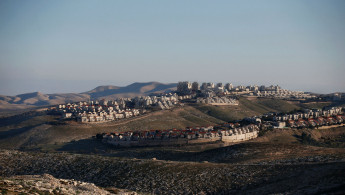UN reviews 206 companies 'linked' to Israeli settlements
The UN human rights office said Wednesday in a long-awaited report that more resources were needed to handle the complex and unprecedented task of compiling what Israeli officials have described as a "blacklist".
Both the US and Israeli governments have criticised the UN effort, however, proponents insist that companies must be held accountable, arguing that their activity in the illegal settlements contributes injustice against the Palestinians.
The 16-page report does not mention any companies by name, however, alludes to further work that needs to completed. Sixty-four companies were contacted by the UN office, however would not be identified until all 206 companies had been contacted.
Of the 206 companies, 143 are based in Israel and 22 in the US. Of the other 19 countries linked to such companies, Germany is home to seven and the Netherlands to five.
The review could lead to a public naming and shaming of companies, and buttress the efforts of the BDS movement (boycott, divest and sanction), a grassroots campaign that hopes to pressure Israel through action against companies.
"The violations of human rights associated with the settlements are pervasive and devastating, reaching every facet of Palestinian life," the report said.
It cited restrictions on movement, freedom of religion, education and land ownership faced by Palestinians in east Jerusalem and the West Bank.
"Businesses play a central role in furthering the establishment, maintenance and expansion of Israeli settlements."
"Business enterprises may need to consider whether it is possible to engage in such an environment in a manner that respects human rights," it said.
Around 115 others were eliminated after a preliminary review.
The US and Israel have been strongly critical of a resolution passed by the 47-member Human Rights Council in March 2016. The resolution, which called for the creation of the database of companies found to engage in activities explicitly linked or supportive of settlements, paved the way for the review.
Israeli officials said they will fight what they described as an "unfair blacklist", and Israeli ambassador claiming the review pointed to the council's "moral bankruptcy".
"We view the report, and the initiative as a whole, as fundamentally illegitimate," said Aviva Raz Shechter, the Israeli ambassador in Geneva.
"It is, in our view, outside the competence and the authority of the Human Rights Council... This is kind of another instrument to pursue a discriminatory and politically motivated agenda."
Washington also lashed out at "such biased and politicised actions taken against Israel".
"We have not provided, and will not provide, any information or support to the Office of the High Commissioner in this process," the US State Department statement said. "We strongly urge other countries to do the same."
Israel sees the boycott movement as a strategic threat and accuses it of anti-Semitism - a claim activists deny, saying they want only to see an end to Israel's occupation.
On Wednesday, a Kansas anti-BDS law requiring anyone contracted by the state to pledge against a boycott of Israel was overturned, in a show of Palestinian solidarity amid an escalation of anti-BDS laws in the US.





 Follow the Middle East's top stories in English at The New Arab on Google News
Follow the Middle East's top stories in English at The New Arab on Google News
![Both Hamas and the Palestinian Authority welcomed the ICC arrest warrants [Getty]](/sites/default/files/styles/image_330x185/public/2024-11/GettyImages-2178351173.jpg?h=199d8c1f&itok=TV858iVg)

